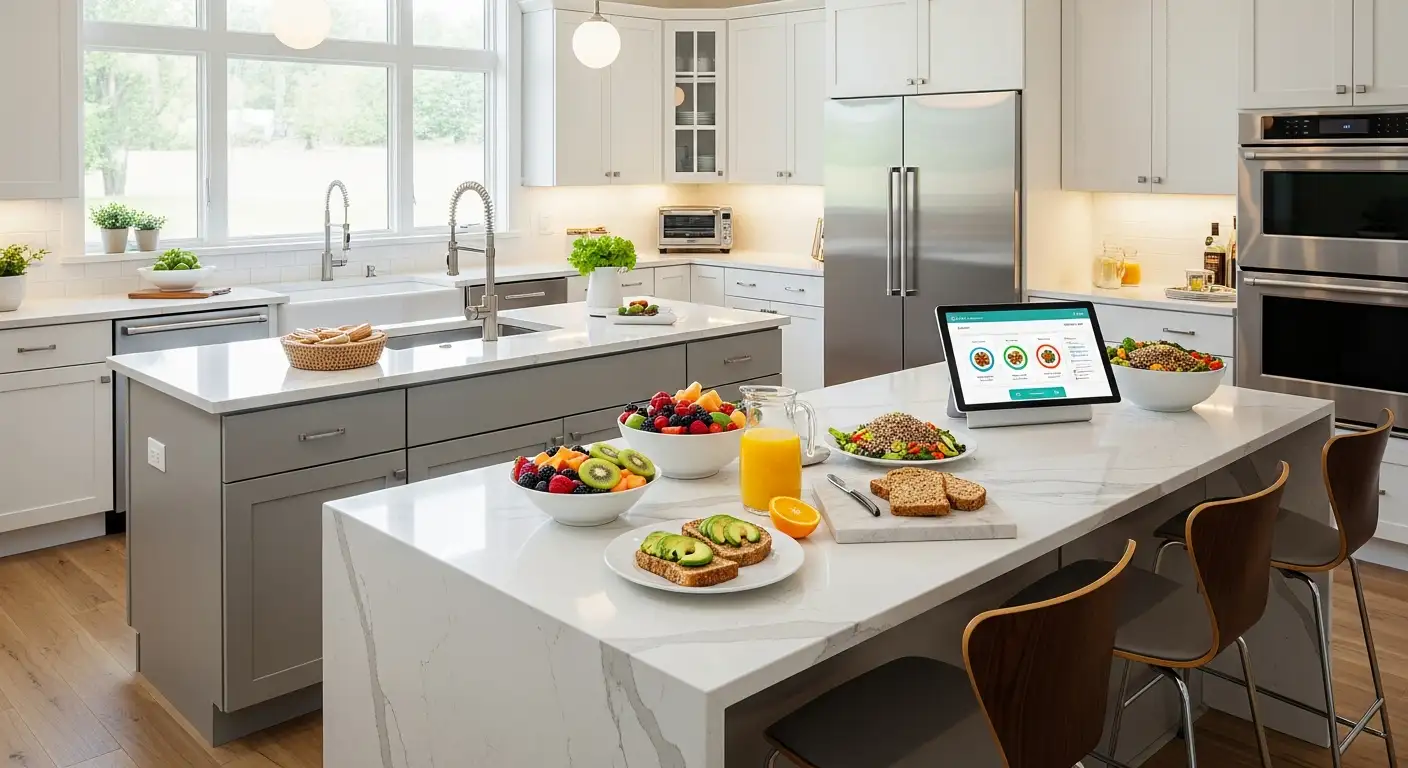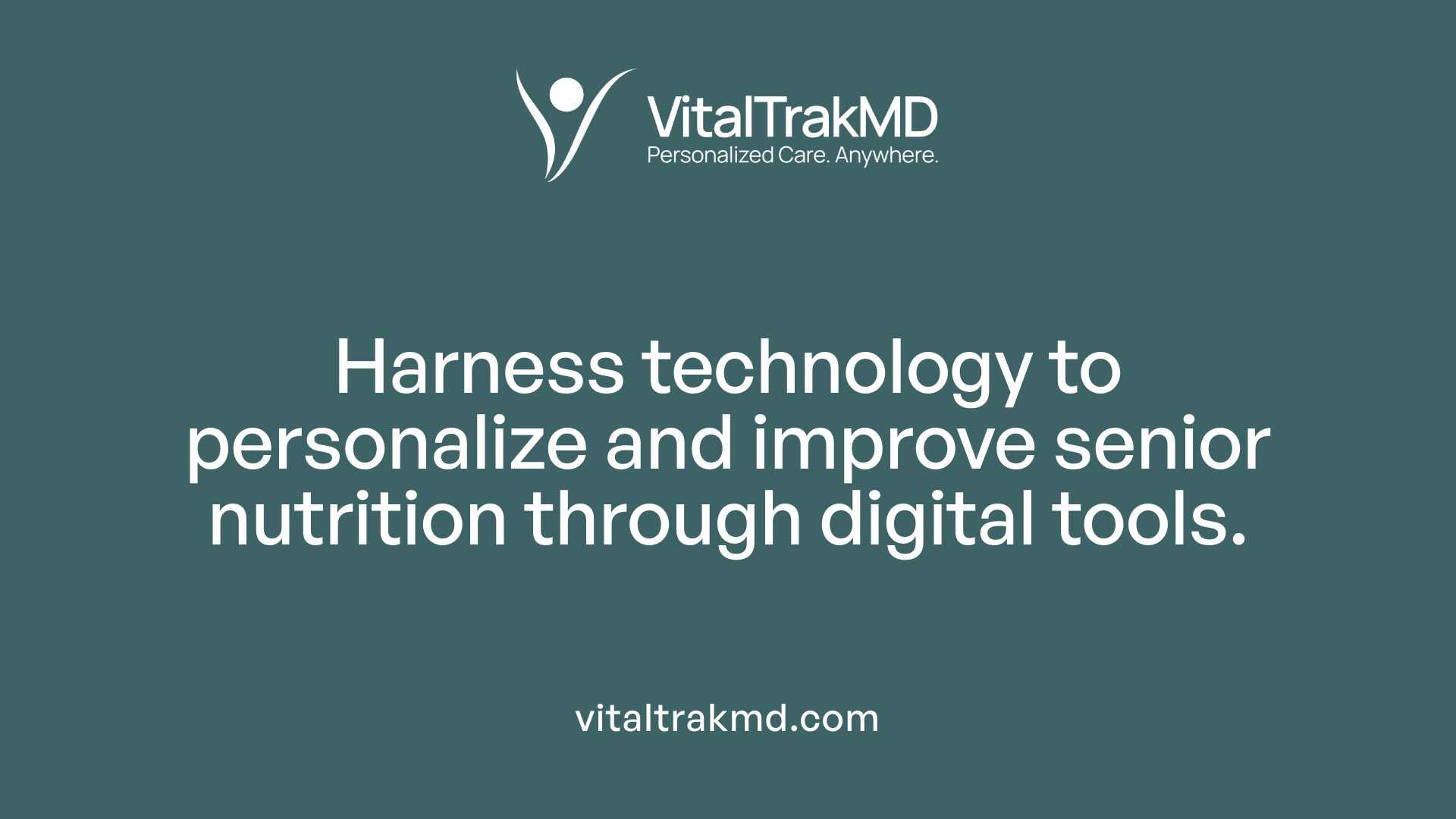How Hybrid Healthcare Helps Seniors Maintain Balanced Nutrition Plans

The Vital Role of Balanced Nutrition in Senior Wellness
Maintaining balanced nutrition is a cornerstone of health and wellbeing for seniors, directly impacting their quality of life and independence. However, as individuals age, nutritional needs evolve, and challenges such as chronic health conditions, medication effects, and lifestyle limitations can complicate maintaining an optimal diet. Hybrid healthcare models, which integrate digital tools and in-person support, are emerging as powerful solutions to help seniors manage and maintain balanced nutrition plans effectively. This article explores how these novel healthcare approaches assist seniors in navigating their nutritional needs with ease and confidence.
Understanding the Nutritional Challenges Faced by Seniors

Age-related changes affecting nutrition
As people age, their bodies undergo several changes that can impact nutritional health. These changes include a decrease in metabolic rate, leading to lower calorie needs, and alterations in taste and smell, which can reduce appetite. Additionally, older adults often experience diminished digestive function, including decreased enzyme production, which can affect nutrient absorption.
Common health conditions influencing dietary needs
Seniors are more likely to face health conditions such as osteoporosis, heart disease, diabetes, and hypertension. These conditions alter nutritional requirements; for example, osteoporosis may require increased calcium and vitamin D intake, while diabetes management involves monitoring carbohydrate consumption. Medications for these diseases can also interfere with nutrient absorption or alter appetite.
Barriers to balanced nutrition for seniors
Several obstacles can prevent seniors from maintaining a balanced diet. Physical limitations may make shopping or cooking difficult. Cognitive decline can also affect meal planning and food safety. Economic constraints often limit access to fresh and nutritious foods. Social isolation can decrease motivation to prepare well-balanced meals, contributing further to nutritional challenges.
What Is Hybrid Healthcare and Why It Matters for Senior Nutrition

What is Hybrid Healthcare?
Hybrid healthcare is a modern approach that combines traditional in-person care with digital health technologies. This model leverages tools like telemedicine, remote monitoring, and mobile health apps alongside face-to-face consultations.
Components of Hybrid Healthcare Models
Hybrid healthcare models typically include several elements:
- In-person visits: Essential for physical examinations and personalized assessments.
- Telehealth services: Enable virtual consultations, reducing the need for travel and increasing accessibility.
- Remote monitoring: Devices track vital signs and health metrics in real time.
- Digital platforms: Apps and portals facilitate communication, appointment scheduling, and nutritional tracking.
Advantages Over Traditional Care Approaches in Nutritional Management
For seniors, hybrid healthcare offers significant benefits in nutritional care, including:
- Improved access: Seniors can receive follow-ups and guidance without frequent clinic visits.
- Personalized monitoring: Continuous tracking helps adjust nutritional plans swiftly based on real-time data.
- Enhanced engagement: Digital tools encourage active participation in managing dietary needs.
- Cost efficiency: Combining remote and in-person care can reduce overall healthcare costs.
Overall, hybrid healthcare supports more flexible, responsive, and comprehensive nutritional management for seniors, addressing challenges like mobility limitations and chronic conditions effectively.
Integrating Digital Tools to Monitor and Manage Nutrition

How are apps and wearable devices used in nutrition management?
Apps and wearable devices play a crucial role in tracking dietary habits and physical activity. They help users log meals, count calories, and monitor nutrient intake, making nutritional management more accessible and personalized.
What role does remote nutritional assessment play?
Remote nutritional assessments enable healthcare professionals to evaluate an individual's nutritional status without needing in-person visits. This approach uses digital surveys, video consultations, and data from wearable devices to provide timely insights into dietary needs and health risks.
How does real-time data tracking and feedback improve nutrition?
Real-time tracking offers immediate feedback on food choices and activity levels. This instant information helps individuals adjust their eating habits and physical activity promptly, leading to better adherence to nutrition plans and improved health outcomes.
The Role of Telehealth Consultations in Personalized Nutrition Planning

How Does Telehealth Improve Access to Dietitians and Nutritionists?
Telehealth has revolutionized access to personalized nutrition by connecting individuals with dietitians and nutritionists regardless of their location. This is particularly beneficial for seniors or those living in remote areas where in-person visits can be challenging. Through video calls and online platforms, patients can receive expert guidance conveniently from home.
What Are the Benefits of Frequent Virtual Visits for Diet Adjustments?
Frequent telehealth consultations allow dietitians to monitor progress closely and make timely dietary adjustments. This continuous interaction helps maintain motivation, address emerging nutritional issues, and customize plans as health needs evolve. Regular virtual visits reduce delays in care and optimize nutritional outcomes.
How Does Telehealth Support Chronic Disease Management Through Nutrition?
Nutrition plays a vital role in managing chronic conditions such as diabetes, heart disease, and kidney disorders. Telehealth enables personalized nutrition plans tailored to these illnesses and facilitates ongoing education and support. By integrating telehealth into chronic disease management, patients can better adhere to dietary recommendations, improving health markers and quality of life.
| Aspect | Description | Benefits |
|---|---|---|
| Access to Professionals | Connects patients to qualified dietitians remotely | Overcomes geographic and mobility barriers |
| Frequent Monitoring | Enables regular diet plan updates and progress tracking | Ensures timely adjustments, enhancing effectiveness |
| Chronic Disease Support | Provides tailored nutrition for disease-specific needs | Improves disease control and reduces complications |
Combining In-Home Care and Professional Guidance
In-Person Assistance with Meal Preparation
One of the major benefits of in-home care for elderly individuals is the direct help provided with daily tasks such as meal preparation. Caregivers assist in selecting nutritious foods, preparing balanced meals, and ensuring the dishes meet any specific dietary requirements. This hands-on approach helps maintain proper nutrition and supports overall health.
Educating Caregivers and Family Members
Professional guidance often includes educating caregivers and family members about nutritional needs and special dietary considerations for older adults. Training sessions or informational materials help them understand how to accommodate restrictions like low sodium, diabetes-friendly, or heart-healthy diets. This knowledge empowers families to contribute effectively to the elder’s wellbeing.
Reinforcing Dietary Adherence Through Routine Support
Consistency is crucial for dietary adherence. In-home care providers not only prepare meals but also help establish and maintain regular eating schedules. Routine support ensures that elderly individuals consume their meals on time and uphold recommended diets, which enhances nutrient intake and prevents complications related to poor nutrition.
Integrating in-home care with expert nutritional advice creates a supportive environment that fosters healthy eating habits and improves quality of life for seniors.
Empowering Seniors Through Self-Management Education and Technology
How Can Training Seniors in Digital Health Literacy Improve Their Nutrition?
Digital health literacy equips seniors with the skills to navigate health information online, use apps, and manage health devices effectively. By understanding how to access reliable nutrition data and tools, seniors can make informed dietary decisions tailored to their specific needs.
What Role Does Encouraging Proactive Nutritional Choices Play?
Encouraging seniors to take active ownership of their nutritional habits helps them prevent malnutrition and manage chronic conditions. Educational programs underline the importance of balanced meals, proper hydration, and smart grocery shopping, empowering seniors to choose foods that support their health goals.
How Does Building Confidence Influence Personalized Nutrition Management?
Confidence is crucial for seniors to apply knowledge and maintain consistent nutrition habits. With hands-on guidance, seniors learn to customize meal plans, track their progress, and adjust strategies as needed, fostering independence and better health outcomes.
Technology combined with targeted self-management education creates an environment where seniors feel supported and capable in managing their dietary health. This holistic approach enhances their well-being and quality of life.
Addressing Social and Emotional Factors in Nutrition via Hybrid Care

How can hybrid care combat loneliness and its impact on diet?
Loneliness is a significant social factor that affects nutritional health, especially among seniors. Hybrid care models combine in-person check-ins with virtual support, providing regular social interaction that helps reduce feelings of isolation. This continuous engagement encourages adherence to healthier eating habits by fostering accountability and emotional support.
What role do virtual groups play in community engagement?
Virtual groups create a sense of community by connecting individuals with similar nutritional goals or health concerns. These online platforms facilitate sharing recipes, tips, and motivational stories, which help maintain interest in healthy eating. They allow participants to experience companionship and peer encouragement without geographical constraints, reinforcing positive dietary behaviors.
How is mental health support integrated with nutrition management?
Integrating mental health care with nutrition services addresses the emotional drivers behind eating habits. Hybrid care can include consultations with mental health professionals alongside dietitians, offering a holistic approach. This integration helps identify stress, depression, or anxiety factors that might lead to poor nutrition and provides coping strategies that promote better overall health outcomes.
Case Studies Highlighting Successful Hybrid Nutritional Interventions
Examples of Senior Patients Benefiting from Hybrid Care
Hybrid nutritional care blends online and in-person support, making it especially effective for seniors. One case involved Ms. L, a 75-year-old with type 2 diabetes and mobility issues. She received online nutritional counseling complemented by monthly clinic visits, leading to improved dietary adherence and better blood sugar control. Another example is Mr. G, an 82-year-old recovering from a stroke; hybrid care ensured tailored meal plans that accommodated his swallowing difficulties and delivered significant health improvements.
Outcomes in Nutrition and Overall Health
These hybrid approaches have shown notable positive results. Seniors experienced enhanced nutrient intake and reduced risk of malnutrition. Follow-up and continuous monitoring enabled timely adjustments to meal plans. Furthermore, many patients reported increased confidence in managing their diets and greater satisfaction with the care process.
Lessons Learned and Best Practices
Successful hybrid interventions emphasize personalized plans integrating technology with human touchpoints. Key lessons include ensuring easy-to-use digital platforms for seniors, training caregivers on monitoring nutrition remotely, and scheduling periodic face-to-face interactions. Collaboration among dietitians, physicians, and caregivers fosters comprehensive support. Importantly, regular feedback loops enable ongoing refinement of nutritional strategies, reinforcing the effectiveness of hybrid care models.'
Technology Accessibility and Overcoming Barriers for Seniors
Handling technology skepticism among seniors
Many seniors are initially hesitant to embrace new technology due to unfamiliarity or concerns about privacy and security. Addressing this skepticism requires patience and clear communication. Explaining the direct benefits of the technology, such as easier communication with loved ones or improved health monitoring, can motivate adoption.
Simplifying user interfaces
Designing technology with seniors in mind often means creating straightforward, easy-to-navigate interfaces. This includes larger buttons, clear text, minimal steps to complete tasks, and intuitive design elements that reduce confusion. Devices and apps that focus on simplicity help seniors feel more confident and reduce frustration.
Training and ongoing technical support
Providing accessible training sessions tailored to seniors' learning paces is crucial. Hands-on demonstrations and easy-to-follow guides can enhance understanding. Moreover, ongoing support through help lines, community centers, or home visits ensures seniors can get assistance when encountering issues, reinforcing consistent technology use and reducing feelings of isolation.
Future Directions: Innovations and Expanding Hybrid Healthcare for Senior Nutrition
What Emerging Technologies and AI Potentials Are Shaping Senior Nutrition?
Advances in artificial intelligence and wearable technology are transforming senior nutrition management. AI-powered apps now analyze dietary habits to provide personalized meal plans tailored to specific health conditions common in older adults. Wearable devices monitor hydration, nutrient intake, and physical activity in real time, alerting caregivers and healthcare providers to potential deficiencies or risks before symptoms escalate.
How Are Policy and Healthcare Systems Integrating These Innovations?
Governments and healthcare organizations increasingly recognize the value of hybrid healthcare models that blend in-person and digital approaches. Policies promoting telehealth reimbursement, data interoperability, and digital literacy training are vital to this integration. Such frameworks ensure that seniors receive seamless nutritional support within existing healthcare structures, emphasizing prevention and chronic disease management.
What Challenges Exist in Scaling Hybrid Models for Broader Impact?
Scaling hybrid nutrition care requires addressing digital access disparities among seniors and training healthcare workers in new technologies. Partnerships across public health, technology sectors, and community organizations are essential. These collaborations can expand reach, customize interventions, and evaluate outcomes to refine best practices for widespread adoption.
The trajectory of hybrid healthcare for senior nutrition is poised for growth driven by technological innovation and supportive policy. Focusing on inclusive access and sustainable integration will unlock its potential to improve quality of life for aging populations worldwide.
Optimizing Senior Health Through Hybrid Healthcare Nutrition Strategies
Hybrid healthcare represents a transformative approach to senior nutrition, blending the strengths of technology with the human touch of in-person care. By addressing the unique challenges seniors face in maintaining balanced diets, facilitating personalized and ongoing nutritional support, and fostering empowerment through education and accessible tools, this model helps seniors achieve better health outcomes and preserve their autonomy. As technology continues to evolve and healthcare frameworks adapt, hybrid approaches will become increasingly vital in supporting seniors’ nutritional wellbeing, ultimately enhancing quality of life and wellness in aging populations.
References
Recent articles
Want to Feel Better and Live Healthier?
Join hundreds of patients taking control of their health with personalized care that fits their life – not the other way around.
Rated 4.8/5 by 32+ customers







